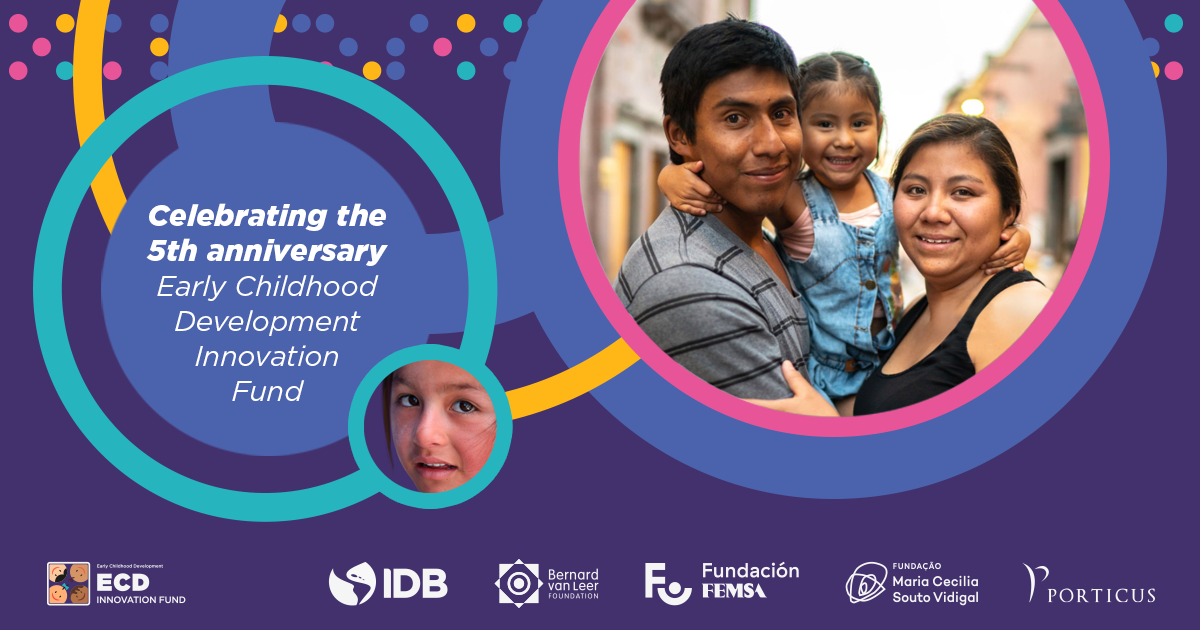Did you know that in Ecuador a child living in a low-income household knows a quarter of the words that a child from a high-income household does? In Latin America and the Caribbean, despite the significant improvements in mortality and morbidity rates, and access to early childhood development (ECD) services, the biggest challenge to achieve greater impact and break the cycle of poverty remains the same: scaling up services with quality. At the ECD Innovation Fund, we celebrated our 5th anniversary with a key conversation on how to address this major challenge for the present and the future.
In this anniversary webinar, Ferdinando Regalia and Florencia Lopez Boo provided a regional overview of the policies surrounding this issue and the important role the IDB has played in supporting countries in the region to ensure that new generations are healthier, happier, better educated, and more productive.
This is urgent. Especially after the negative impact that COVID-19 had on children: child poverty increased, a nutritional and child care crisis emerged, and enormous losses in development and learning are observed. Among the most worrying figures, we see that almost half a million children lost their primary caregiver in Argentina, Brazil, Colombia, Mexico and Peru; and women were 44% more likely than men to lose their jobs at the beginning of the crisis.
But not all the news is negative. We have identified five essential actions to recover development losses and ensure child well-being:
1) Prioritize quality improvement in all early childhood services.
2) Articulate early childhood programs (family work programs and center-based care) with social protection (transfers), health, nutrition, and protection programs.
3) Measure child development on a frequent basis (this will be vital to monitor losses and recoveries, and to adjust remedial interventions).
4) Focus curricula on skills that have been lost (language and social-emotional skills, for example).
5) Leverage the hybrid modalities we learned so much about during the pandemic to reach families whose access to face-to-face services may be more complex.
In addition, there are initiatives that have been successful in providing services and teach us lessons that can guide policy makers and innovators throughout the region. We heard about some of them in the panel moderated by Luciana Vázquez, columnist for La Nación in Argentina, which included interventions by María Inés Castillo, Minister of Social Development of Panama; Paula Valenzuela Delpiano, Head of Promotion and Prevention Division at the Office of Children’s Affairs in Chile; and Paul Gertler, Professor of Economics at UC Berkeley.
Jamaica: compelling evidence for the region
One of the most emblematic cases when talking about ECD is Jamaica’s Reach Up program. Paul Gertler highlighted the longitudinal studies carried out with this program, which showed that, thirty-one years later, after receiving home visits between the ages of 9 and 24 months, children in adulthood have 43% higher salaries than the control group, and are 26% more likely to hold a university degree. The high level of training and coaching of the professionals who conducted the visits is a key element of the program’s success.
Panama: comprehensive early childhood care
Minister Maria Ines Castillo described how Panama provides comprehensive early childhood services throughout the country, also leveraging new modalities that emerged during the pandemic. The minister highlighted that these efforts were possible thanks to the enactment, in 2020, of Law 171 on Comprehensive Early Childhood Protection with its six axes: family perspective, comprehensive early childhood care, provision of services -universal and targeted-, protection and prioritization of the budget allocated to early childhood, transparency and territorialization of actions.
Chile: high standards with quality assessment
Paula Valenzuela provided programmatic and financing details of the renowned Chile Crece Contigo subsystem, which was created based on the evidence of several programs that have shown impact and were incorporated into regular children’s services. At the same time, quality standards and evaluation mechanisms were developed in a large-scale public policy implementation. That is, while betting on nationwide coverage with high basic standards, quality was assured through the evaluation of each of the programs that conform the subsystem.
These three experiences shed light on some of the keys to improving the lives of children, guaranteeing a better future for the region: rigorous measurement of the impact of programs, laws in line with programmatic needs, intersectoral work, generation of knowledge to inspire the implementation of proven programs, and great political will.
Do you want to know more? You can listen to the entire conversation in the video below and continue celebrating the 5th anniversary of the ECD Innovation Fund with us by posting your impressions via the hashtag #ECDhubLAC.
The Early Childhood Development (ECD) Innovation Fund is a partnership to finance, design, implement and evaluate innovative and scalable solutions to improve the lives of children in Latin America and the Caribbean. The Fund is coordinated and managed by the Inter-American Development Bank (IDB), in partnership with the Bernard Van Leer Foundation, FEMSA Foundation, Maria Cecilia Souto Vidigal Foundation, Open Society Foundations and Porticus. Currently, it has a growing portfolio of 20 projects in execution and 6 in preparation, located in 10 countries, and a Knowledge Hub on Early Childhood Development.


Leave a Reply